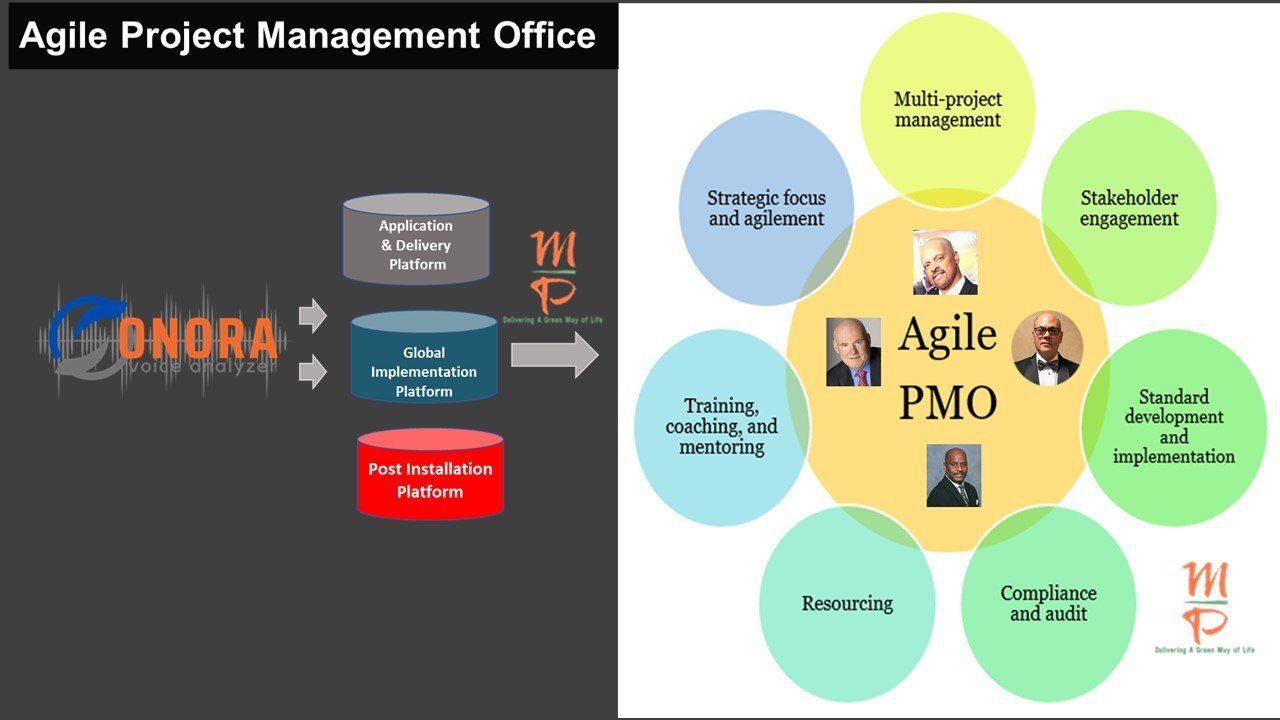Program Management Office
(PMO)
The TMP PMO delivers an Agile Methodology Approach to
Program Management
Establish Project Governance Structure
Our PMO establishes a project governance framework that has a structured approach to govern the projects. It involves various stakeholders like team members, project managers, project sponsors, investors, and clients. These stakeholders have well-defined roles, responsibilities, and decision-making capacities. Purpose of governance structure is to ensure that:
- The projects are prioritized and aligned to short- and long-term goals of the business
- The right people have access to the right information to make the right decisions
- The projects are staying within the planned time and budget
- Enterprise resources are utilized in the most efficient manner
- There are ongoing risk assessment and mitigation across all projects
Provide Management Reports
One of the core responsibilities of a PMO is to centralize information and deliver it to the right stakeholders. It is to ensure that the management makes informed and timely decisions for the success of the project. Following are some of the examples of management reporting:
- Overall progress and health of projects
- Status of milestones and deliverables across the portfolio
- Financial information about the budget, forecast, actuals, margins, etc.
- Project risks and progress on mitigating these risks
- Operational efficiency and project performance
- Effective management and utilization of enterprise resources
Prioritize Projects as per Strategic Business Objectives
Setting up operational and strategic objectives is a critical part of future business planning. They are key to short- and long-term business success. These objectives are achieved with the help of various programs and portfolios consisting of projects. The PMO plays a crucial role in this process and carries the following responsibilities:
- Ensure that the programs and portfolios are aligned to operational and strategic objectives
- Projects are selected and prioritized as per these business goals
- Enterprise resources are allocated and utilized as per business goals
- Design and track various program and portfolio performance KPIs
Plan and Schedule Resource Efficiently
Resource planning and scheduling are one of the most critical responsibilities of a successful PMO. This process ensures that the right resources are allocated to the right project at the right time. These are some highlights of efficient resource planning and scheduling:
- Eliminate silos of spreadsheets with a single resource plan
- Create visibility of resource capacity, competency, and availability for all stakeholders
- Establish a real-time resource scheduling to accommodate the fast-changing ground reality
- Track all types of work, i.e., project work, non-project work, vacation, etc.
- Establish multi-dimensional viewing and overcome challenges of matrix structure
Forecast and Enable Resource Capacity Planning
In a dynamically changing business environment, it is critical for a PMO to forecast and get real-time foresight into project resourcing. So that the PMO can take corrective actions ahead of time. Few examples of resource forecasting:
- Forecast capacity vs. demand to identify shortfall or excesses of the resources
- Forecast people on the bench and project vacancies to minimize resource wastage
- Forecast resource management financials to determine the margin and profitability
Streamline and Automate Processes and Workflows
As an integral part of performance improvement, PMO streamlines various project management processes and methodologies.
- Establish project requesting, selection, and prioritization process
- Streamline workflow for resource requisition and allocation
- Gathering up to date information about employee skills, interests, experience
- Forecast and provide early warning before it is late
Reuse Project Learning and Knowledge
The PMO enables team efficiency by facilitating knowledge transfers between departmental project teams. It makes project plans, reviews, templates, and documentation widely available to concerned members, saving time and costs that would have otherwise gone into rework. Rather than reinventing the wheel, project teams can not only shorten their learning curve but can also get more work off the ground from the organizational knowledge being shared.
Maximize Strategic & Billable Resource Utilization
A mature PMO provides mentoring support and coaching to the project managers. After all, they are at the heart of the project lifecycle. Developing a project manager’s competencies enhances his/her ability to lead and manage both project execution and team dynamics. What’s more, it equips them to gauge their team’s strengths and prevent conflicts between members. This way, projects can tap into potential from within, with staff whose key skills and knowledge can be used to complete tasks and help one another out.
Mentor and Train Project Managers
For a project-based company, it is critical that the employees are either working on a billable project or strategic project. So, it is crucial for a PMO to work on maximizing billable and strategic utilization of its workforce. To achieve this, a PMO constantly forecasts the utilization of resources and moves them to billable and strategic projects.
Facilitate Team Collaboration and Communication
It is now a critical responsibility of a PMO to ensure that there is an efficient framework for seamless team collaboration and communication among team members. It helps in:
- Aligning remote teams and bringing everyone on the same page
- Completing tasks faster without unnecessary waiting
- Communicating faster with the right person without chaos
- Addressing urgent issues faster and effectively

a b c d e f g h i j k l m n o - Do not remove from template!!! it is important to support different fonts
Corporate Office:
The Mosely Partners LLC
New York Office:
314 Route 94 South
Suite 125
Warwick, New York 10990
info@themoselypartner.com
(240) 486-9670
